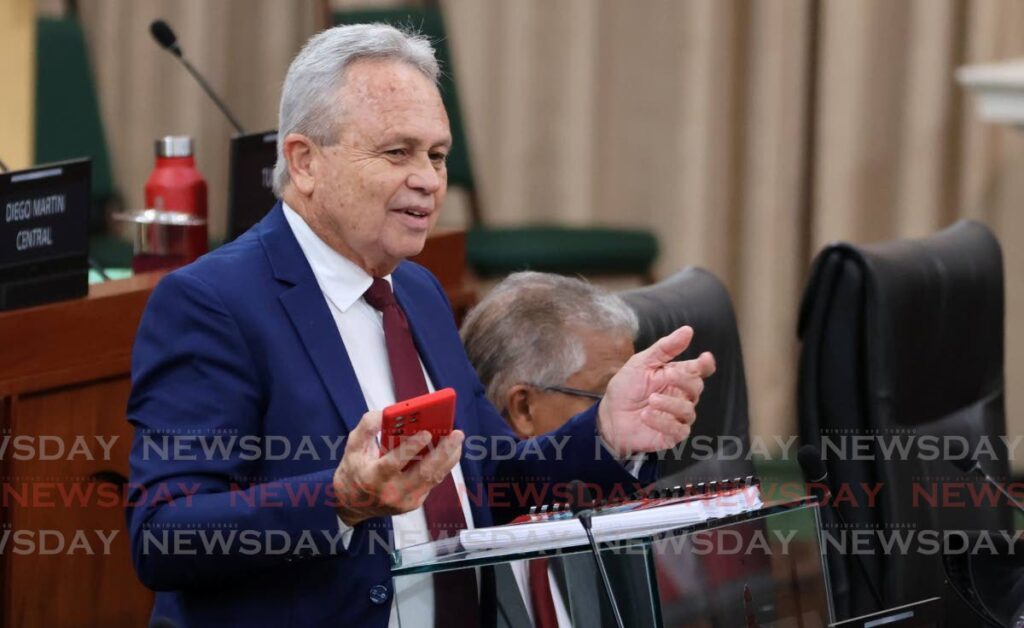Imbert: Recycling companies to get assistance

PUBLIC Utilities Minister Colm Imbert has promised government assistance to companies involved in the recycling of plastic bottles, such as Every Bottle Back (EBB) and I-Care. He said these initiatives help build a culture of responsibility and a cleaner, greener, and more secure future.
Speaking at the launch of the EBB baling facility at Company Trace, Mt Lambert, Imbert said the ministry is firmly committed to supporting positive initiatives like EBB.
“These initiatives don’t just respond passively to a problem, but actively work to address and prevent it. We at the ministry are thus committed to providing legislative and financial incentives and support for timely recycling initiatives such as Every Bottle Back TT.
“To put it simply, just say what you want the Government to do to promote and support the recycling of plastic bottles, and, in due course, all types of bottles and beverage containers, and we will accommodate your requests in whatever way possible, since this is a shared vision.”
This statement was greeted by cheers from those present at the launch of the project, including representatives from Blue Waters Products Ltd, Caribbean Bottlers TT, Nestle and others.
Imbert said the project was vision translated into action, grounded in responsibility, innovation, and a shared commitment to protecting the environment, communities, and TT’s future.
“Blue Waters Products Ltd and Caribbean Bottlers TT Ltd, although business competitors, have united in this national effort, supported by Nestlé TT, and Republic Bank, as well as the Inter-American Development Bank Lab and the European Union via the Caribbean Industrial Research Institute (CARIRI).”
He said the need for the change in TT was clear.
“After any significant rainfall, we see plastic bottles gathering in our rivers, clogging our drains, backing up culverts, and worsening the impact of flash floods. This is not just an eyesore or environmental hazard.
“This is a reminder that when waste is not managed, it becomes a problem for everyone. The simple flow of water off land and property becomes a costly and dangerous situation, one that affects homes, businesses, public health, and national infrastructure.”
He said initiatives such as EBB are important because they address the root of the problem by creating systems and behaviours that prevent plastic from entering the environment in the first place.
Imbert said plastic bottles are widely used in modern society for many purposes, but the negative effects of plastic waste on ecosystems present substantial challenges that require active response.
“Recycling plastic bottles is a key strategy for tackling these issues because it benefits the economy, society, environment, and public health.”
He said producing new plastic bottles requires a large amount of resources, including fossil fuels, which increases greenhouse gas emissions. He said according to the US Environmental Protection Agency (EPA), recycling one tonne of plastic reduces a country's carbon footprint by conserving 1,000-2,000 gallons of fuel, lowering reliance on resources, and saving energy.
“Recycling plastic bottles also drastically reduces pollution and waste. When these bottles are dumped carelessly, they end up in landfills, oceans, rivers, and other critical ecosystems, thereby threatening biodiversity and species.
“Marine life is particularly vulnerable as marine animals may swallow plastic rubbish and become unwell or become entangled in plastic debris.”
He said recycling plastic bottles also greatly reduces the garbage that ends up in landfills. He said it is estimated that TT generates as much as 130,000 tons of plastic waste per year.
“Another benefit of recycling is a reduction in the demand for virgin plastics, as the mining and processing of raw materials, particularly petroleum, for plastic production have a negative environmental impact, such as habitat loss and increased carbon levels in the atmosphere.”
Imbert said there were health benefits to recycling, including lowering pollution, which had a significant positive influence on public health.
“Unmanaged plastic waste can leach hazardous chemicals into water and soil systems, endangering human health. The health of the local community is thus protected by minimising the amount of plastic bottles in the system.
“Recycling also contributes to better air quality, because burning plastic garbage produces harmful compounds that can cause respiratory and other health issues. Thus, recycling programmes contribute to improved public health, particularly in urban areas, where trash management is problematic.”
Imbert said there were also economic advantages to recycling plastic bottles, as recycling creates job opportunities in a variety of industries such as manufacturing, processing, sorting, and collection.
“Recycling also provides raw materials to companies at a lower cost than virgin plastics, which has fuelled innovation and market competitiveness.”
He said recycling plastic bottles can boost local economies through communal activity because the gathering and processing of recyclable materials can result in the establishment of new businesses.
“Community-based recycling efforts usually encourage local entrepreneurship. In addition to financial benefits, these community-based projects enable local communities to take ownership of waste management techniques, fostering a culture of collaboration and shared responsibilities.”
Imbert said combining recycling programmes with educational initiatives can also help future generations to form long-term habits.
“Recycling integrated into community projects and school curricula would better equip future generations to recognise and prioritise environmental responsibilities.
“To promote a sustainable culture, we must encourage local government bodies and related organisations to implement incentive schemes, such as identifying and rewarding communities that make considerable recycling efforts.”

Comments
"Imbert: Recycling companies to get assistance"